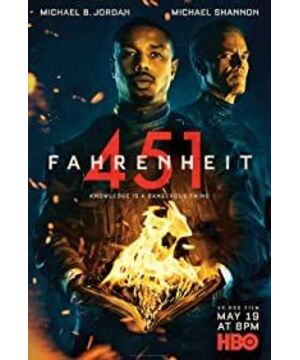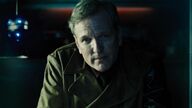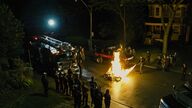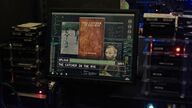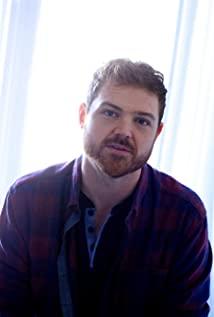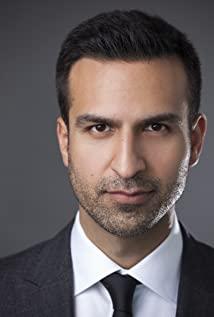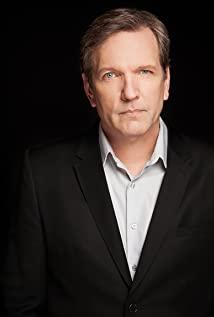Text/Wang Xu
(Film information: "Fahrenheit 451", director: Ramin Bahani, screenwriter: Amir Nadre, starring: Michael B. Jordan, Michael Shannon, Sophia Paotra, United States, 2018)
Although compared with the novel of the same name, the film "Fahrenheit 451" added some of the production staff's perception and thinking about the real world, but its uncompromising belief in immortality is still consistent with the spirit of the original, allowing the film to fly with the light of hope from beginning to end. The firm belief and pursuit of universal land.
In the future world, the symbol of national power will no longer be the army and the police, but firefighters will replace them. The police officers on the streets were firefighters, and the suspects were arrested at the border by firefighters. Firefighters, as an emerging symbol of national power, have also assumed the task of educating and demonstrating the new generation in school classrooms. This is the collective will of the future world. It is characterized by the prohibition of knowledge and achieves the social harmony emphasized by the government through indoctrination of children.
The prohibition of knowledge lies in the redefinition of books. As shown in the film, in the future world, possession of paper and pen is a felony, and Kafka is portrayed as a pornographic writer, cursed and cast aside. But whether paper and pens as writing tools, or Kafkas as writers, they are all the profiles that build the tangible things like books. Or, conversely, it can be understood as a book as a medium that carries the thoughts and wisdom of the bright stars since the beginning of human society.
These heavy spiritual treasures have disappeared under the firefighters' fire guns in the future world. This is the "anti-intellectual" theme expressed in the film, and it is also a vivid horror picture of the future. In this horrible scene, the presentation and indoctrination to the children fills in a missing link in the original novel. Bradbury neglects the future world in his novels. For officials, maintaining a terrifying reign also requires the fact that generational inheritance is taken into account in his own governance measures. Film workers are fully aware of this. Therefore, in the film where firefighters act as lecturers, the two-pronged teaching method of demonstrating and instilling is exactly what the official advocates is to start with the baby in order to obtain "long-term stability". A true portrayal of his social governance philosophy.
The "demonstration as supplement, inculcation as the main" teaching, under the guidance of Captain Beatty, achieved the expected effect of passionate sentiment. The children remembered that the book is the preaching of the enemy, which made Montag's book-burning demonstration drew a thunderous roar. In this sound wave composed of immature childish voices, the official will is once again emphasized. It is not that it is not allowed to read, but to read the official bibliography. "The Bible", to realize the peace of soul conversion; "To the Lighthouse", to find inner harmony; "White Whale", to be a conqueror, fight bravely with the enemies of this world, the "eels".
"Eel", the title of the "booker" in the novel in the movie. This title comes from the official slanderous reference to minority ethnic groups. If the "book writer" also embodies self-respect, the "eel" is the official derogation of the personality of the minority ethnic groups whose identities have been deleted. These people called "eels" became the most official people in the world at that time because they clung to their unquenchable beliefs and read the "happiness first" life norm prevailing in the era of anti-algorithms. Because the "eels" hold the key to reveal the truth. The elder among them still remembers that in the past, reporters wrote a report, and after some investigation, there was an objective and fair text. Nowadays, headlines created by algorithms replace human thinking, which makes everything simple. Under the clamor of "happiness is truth", life lost its sense of ritual. The indispensable reliance on artificial intelligence makes life flat and single, which makes chasing happiness a patterned life criterion. Through intensive propaganda methods, it has achieved a deeply accepted effect.
Human beings immersed in happiness do not know that there is a pair of invisible hands dominating and controlling the reliability of artificial intelligence. Yu Kexi, the "TV Wall" in the film, is a product of highly intelligent technology. It can always monitor everyone's vital signs and predict human behavior consciousness. In addition to these public operating modes known to mankind, there are hidden modes that are unknown. When a human issued a "sleep" command to it, Yuxie, who was in a disconnected state, was still able to capture every human move in his eyes. Montag triggered the alarm of the intelligent system by reading the book he stole home from the fire while Yuksey was asleep. This plot implies that human beings rely on artificial intelligence and at the same time become controlled by it for life. prisoner.
To be a prisoner, or to run to freedom, the firefighter Montag chose the latter. In the hiding place of the "Eels", Montag was shocked by the individuals supported by faith, which aroused the character's deep thoughts. Thinking is embodied in the revelation of the truth about the future world led by the plot of the film. In that future world, companies created technology, which in turn created a government with power. In other words, the government and the company are combined into one, forming an omnipresent and invisible official. This official uses firefighters as courts, judges, and law enforcement officers that integrate trials and punishments. With the assistance of Yuksey, they will destroy human knowledge and culture. Eliminate the ability of humans to think and deny, and live a life like a prisoner under the slogan of "happiness is supreme".
This invisible shackle allowed Montag to turn into a tangible thing in the fireman's heart after witnessing an old woman burned with a book, shaking his perception of "happiness first". This is where doubts arise. When there is doubt, there is also questioning, and closeness to the great world built by books. In the process of getting close to the book, Montag learned that the "eels" were hiding and protecting the beautiful past that the official feared. This past is hidden in the minds of the "eels". They write down a book and use memory to protect knowledge. "Song of Songs", "Van Gogh Manuscript", "Anna Karenina", with the memory of the "eels" were preserved, and civilization continued. However, the effort to continue civilization also has irreparable regrets. The old woman who burned with the book is "The Grapes of Wrath". With her death, mankind has lost this book forever, as well as the spirit of mutual assistance and the courage to fight that can be learned from the book.
For Montag, courage is not a demonstration of the personal power of the former firefighter at the end of the film who assisted the "eels" to break through the fire net and run to the light. It is an awakening, a choice to freedom. Regardless of the real world or the world of science fiction, whether it is the present or the future, freedom is always a belief, and it is always a truth that is worth pursuing without being deceived.
(The full text is finished. Written on September 21, 2021)
——The opinions in the article belong to the author, and I am solely responsible for the article, and have nothing to do with the publishing platform (including various websites, forums, self-media, public accounts), reprinted paper media, and others——
About the author: Wang Xu. The pen names used are Wang Muyu, Xu Muyu, Xu Muyu's Bookcase, and Wang Xu 326, who settled in Chongqing.
View more about Fahrenheit 451 reviews


